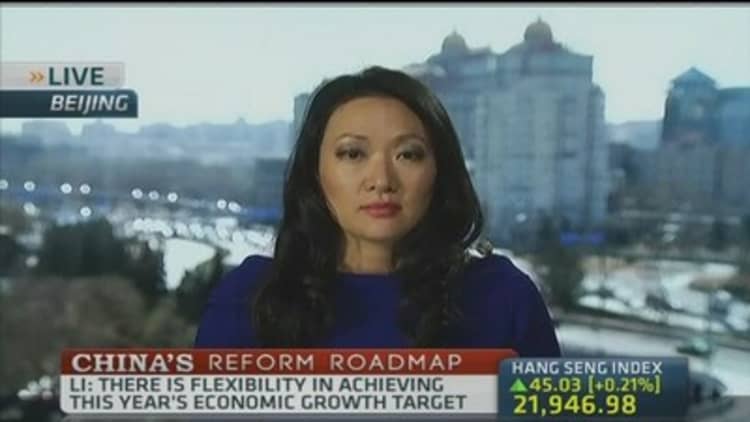There is some "flexibility" around China's 7.5 percent gross domestic product (GDP) growth target for 2014, said Premier Li Keqiang, as concerns around a slowdown in the world's second largest economy resurface.
"We set the GDP growth target at about 7.5 percent; this 'about' shows that there is a level of flexibility," Li said during a press conference at the close of the National People's Congress (NPC) on Thursday, hinting at a willingness to tolerate slower growth.
However, when asked by CNBC what the slowest rate of growth policymakers would tolerate this year was Li did not provide a specific level.

Instead he said, "This GDP needs to ensure fairly full employment and help increase people's income. We aren't preoccupied with the GDP growth. The GDP growth we want is one that brings real benefits to our people, helps raise the quality and efficiency of economic development and contributes to energy conversation and environmental protection."
China's economy expanded 7.7 percent last year, firmly above the government's annual target of 7.5 percent. However, a recent softening in economic data has raised concerns over the economic outlook.
A slew of data released on Thursday including indusial output and retail sales for January and February came in well below economists' forecasts, offering little comfort to investors already spooked by the prospect of a weakening economy.
Despite the Premier's comments on flexibility around growth, Louis Kuijs, chief China economist at RBS believes it remains a top priority for the government.
(Read more: What that China debt default means to the market)
"Beijing takes growth very seriously as was underscored by the government work report submitted to NPC last week. It continues to be the dominant objective of economic policy," Kuijs told CNBC.
"As a result, there's still potential for stimulus. I don't think they should do that, but I wouldn't be surprised if they did," he added.
China's central bank is said to be prepared to take its strongest action since 2012 to loosen monetary policy if economic growth slows further, by cutting the amount of cash that banks must keep as reserves, Reuters reported this week.
(Read more: China central bank ready to act if growth falters)
China's annual meeting of the NPC – the highest organ of state power that meets annually to approve policies, laws, the budget and significant personnel changes – came to a close on Thursday. Around 3,000 delegates attended the meeting in Beijing, which began on March 5.
Financial sector risks
The Chinese government is paying "high" attention to risks in the financial sector, Li said.
While he doesn't want to see defaults of financial products, some cases may be unavoidable. "I'm afraid sometimes certain individual cases of such defaults are hardly avoidable. What we should do is step up monitoring, properly handle relevant matters and ensure that there will be no regional and systemic financial risks," he said.
China's financial sector, particularly the shadow banking industry, has been in the spotlight in recent months after a near high-profile failure of a trust product, which was marketed by ICBC, in January.
(Read more: Get ready for more China shadow-banking defaults)
On elevated local government debt levels, Premier Li said risks in this area are under control, citing the recent debt audit conducted last year.
"Our debt-to-GDP ratio is below the internationally recognized warning line," he said.
"But the government will not overlook the potential risks, we are going to take further regulatory steps, put those debts under budgetary management, and also enhance the oversight of financing vehicles. In other words, we are going to keep the front gate open and lock side doors," he added.

